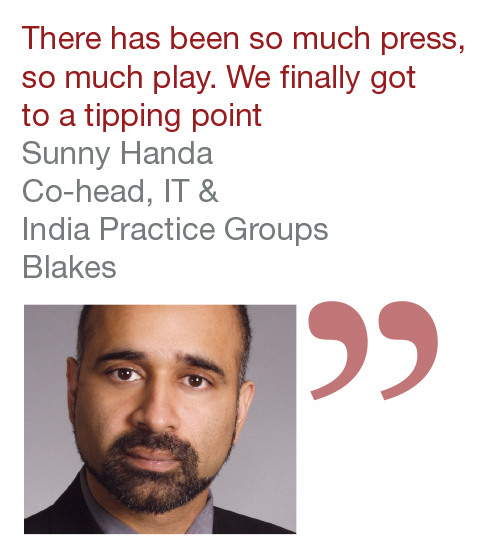Canadian lawyers are witnessing a surge in India-related work as the two countries make good on a shared legal heritage and a partnership in natural resources. Ben Frumin reports
Glenn Faass, the director of Macleod Dixon’s international practice, tells of being in Amsterdam with some Indian clients, receiving tax advice over the phone from Brazil in relation to an acquisition being made there. The Indians and Brazilians all spoke perfectly grammatical, but heavily accented, English.
“The parties couldn’t understand each other,” Faass recalls. “I found myself translating English to English.” At the end of the conversation Faass heard one Brazilian say in Portugese: “Boy, were we ever lucky that one of those Indians spoke unaccented English.”
But Faass is not Indian; like a growing number of lawyers who undertake India-related work, he’s Canadian. “Canadians speak the same English right across the country,” he explains. “It’s largely unaccented and very neutral.”
Unaccented English may not be the most important qualification clients ask of their lawyers, but like many characteristics of Canadian lawyers and law firms, it doesn’t hurt. Commonwealth connections, relatively inexpensive rates in comparison to the US and UK, an Indian population approaching one million, a resilient banking system and a bounty of resources tantalizing to many cash-rich Indian investors – these factors and more are conspiring to create a boom in the amount of India-related legal work that is landing on the desks of Canadian lawyers (see Natural partners?).
Preparing for a new era
“In the past year or so, Ogilvy Renault has devoted a lot of resources toward the India practice group,” says Soma Choudhury, a corporate and securities lawyer with the 450-head Canadian firm. “Not only do we recognize India’s growing economic clout, but that China and India are going to be the biggest players over the next 10 years.”
“The time has come,” says Sunny Handa, co-head of the information technology and India practice groups at Blakes. “There has been so much press, so much play. We finally got to a tipping point. Smaller and mid-size [Canadian] businesses are opening up to those opportunities [in India]. People are now attentive to it.”
The global financial crisis has not affected many Canadian lawyers’ positive outlook towards India. “Our approach has not changed in the context of the current economic crisis,” says Sheel Parekh, an associate with Stikeman Elliott in Toronto. “Stikeman Elliott thus remains firmly committed to India. We continue to have strong faith in the long-term growth potential of the Indian economy, irrespective of the trials and tribulations of the global markets.”
Energy and infrastructure
Indian interest in Canada’s plentiful natural resources is leading to growing Canadian acquisition and investment practices in relation to energy, infrastructure and mining. “Canada is a resource-rich country, probably one of the richest,” Soma Choudhury says. “Resources is going to be big,” she continues. “There is movement there.”
You must be a
subscribersubscribersubscribersubscriber
to read this content, please
subscribesubscribesubscribesubscribe
today.
For group subscribers, please click here to access.
Interested in group subscription? Please contact us.
你需要登录去解锁本文内容。欢迎注册账号。如果想阅读月刊所有文章,欢迎成为我们的订阅会员成为我们的订阅会员。
Natural partners?
Similar approaches to financial regulation and a shared Commonwealth history are just two of the factors binding India and Canada
“Having the large majority of our costs derived in Canada, we tend to be cheaper than the American and British firms,” boasts Glenn Faass, director of the international practice at Macleod Dixon. “It helps that you can say at the end of the pitch, ‘Oh, by the way, we’re significantly cheaper also’.”
Lower fees is just one advantage Canadian lawyers claim when competing for India-related legal work. Because their country has no controversial international history or aspirations of empire, “Canadians don’t carry the baggage that the British and the Americans do”, Faass says. “Canada is sort of an inoffensive country. At the same time, Canada’s a developed country. It’s a member of the G8. It’s well known.”
Faass continues: “Canadian lawyers are well trained. They speak English well. They can compete on a technical level with other top international firms, and Indian companies recognize that and value that.”
The connections don’t stop there. There’s a growing Indian population in Canada with a long history. “The Indians have been here more than 100 years,” says Soma Choudhury, a lawyer at Ogilvy Renault, adding that “every fourth or fifth Indian seems to have a relative sitting in Toronto.”
Shared history
In addition, Canada and India are both members of the British Commonwealth. “That British history binds us very close together,” Soma Choudhury says. “The Indians look toward Britain for drafting most of their laws,” she continues. “It’s similar to what we would have done many years ago back in Canada. The origin is the same: the British legal system. That is a huge, huge advantage.”
Similarities can also be found in the two countries’ banking systems: not too leveraged, relatively cautious and regulated. These days, such banking systems are being held up as shining examples. “It’s paid off,” Soma Choudhury says. “It’s shielded both countries, to some degree, from the meltdown.”
Many observers believe that these similarities make it easier for Canadian lawyers to understand Indian banking and finance, and for some Indian clients to feel comfortable with Canada.
Neena Gupta, a partner at Gowlings, cites her country’s relatively relaxed immigration policy as a factor that stimulates Indian investment. “Our immigration policy is an unsung but huge competitive advantage that we have,” she says. “It is much easier for an Indian company to establish a beachhead here in Canada, transfer their managers, transfer their skilled people, and we don’t have to deal with the quotas that the American system puts on them.”
Political leverage
Of course, there are challenges too – many of them political. “Because we’re a middle power, maybe even lower than a middle power, we can’t provide much political assistance,” Faass laments. “Let’s suppose that you wanted to do a deal in Israel, and you felt that you … needed political support. It’s obvious that having an American law firm with lobbying connections in Washington would be a lot more effective than having a Canadian law firm.
“But on the other hand, if your deal is in Iran, the opposite is the case.”
Another challenge is that Canada and India haven’t always had the warmest or deepest diplomatic relationship. “The relationship between Canada and India has to be leveraged to a larger degree than it has been so far,” Soma Choudhury says. “Both Canadians and the Indians, have to do a little bit more work to bring the business communities closer. We are starting to do that. Both sides are realizing we have to do a little more work.”
Cyndee Todgham Cherniak, an international trade lawyer in Lang Michener’s Toronto office, notes that many Canadians, being somewhat cautious, get nervous about the instability in South Asia. “Some Canadian companies were spooked a little bit by the Mumbai attacks,” she says, adding that she cancelled her trip there in January.
Long way from home
The time zone difference between Canada and India can also “pose a logistical challenge to providing legal advice to clients based in India”, says Jon Levin, a partner at Fasken Martineau.
“That is the challenge right there, the distance,” agrees Ron Choudhury of Aird and Berlis. “If I want to have a very dedicated and successful India practice, there’s no substitute to showing yourself, making contacts, being there.”
Torys partner Michael D Amm says: “While most of our India-related work can be efficiently conducted by way of telephone and email communications, for important and complex matters we will travel to India to be on the ground there with our clients. This may involve a stay of a few days or several weeks, but we believe this is very important in order to provide the best advice and service and be appropriately responsive to client needs.” For example, three Torys lawyers spent 10 days in Mumbai during the final negotiations for Hindalco’s US$6 billion acquisition of Novelis in 2007, and in 2008 two Torys lawyers spent most of October in Mumbai completing “the intensive documentation stage of the US$1 billion refinancing of Hindalco’s bridge loan relating to the Novelis acquisition”.
Still, being in Canada is “probably an advantage or neutral factor more often than it’s a disadvantage,” Faass concludes. “We come to it with kind of an unassuming, humble, non-strident approach. Maybe that’s a typical self-effacing Canadian type of approach.”




























